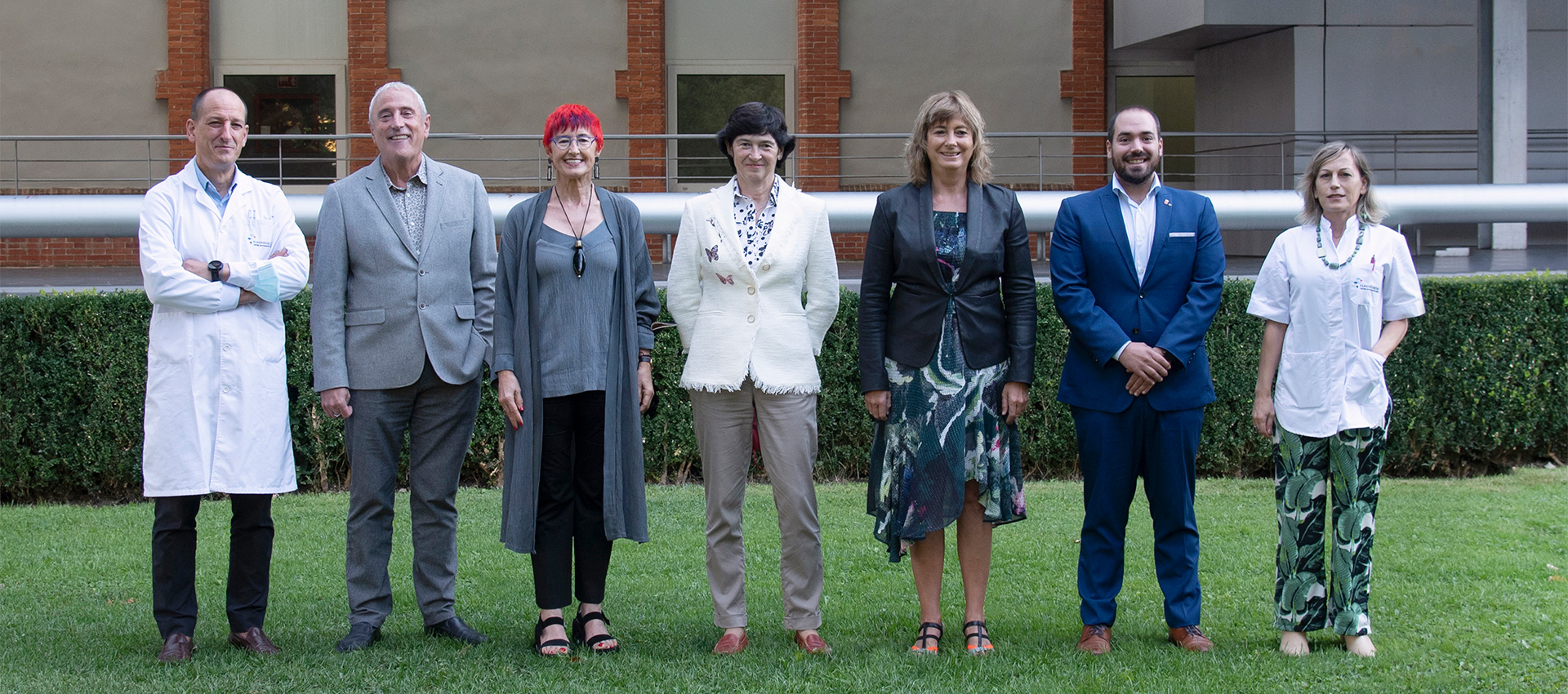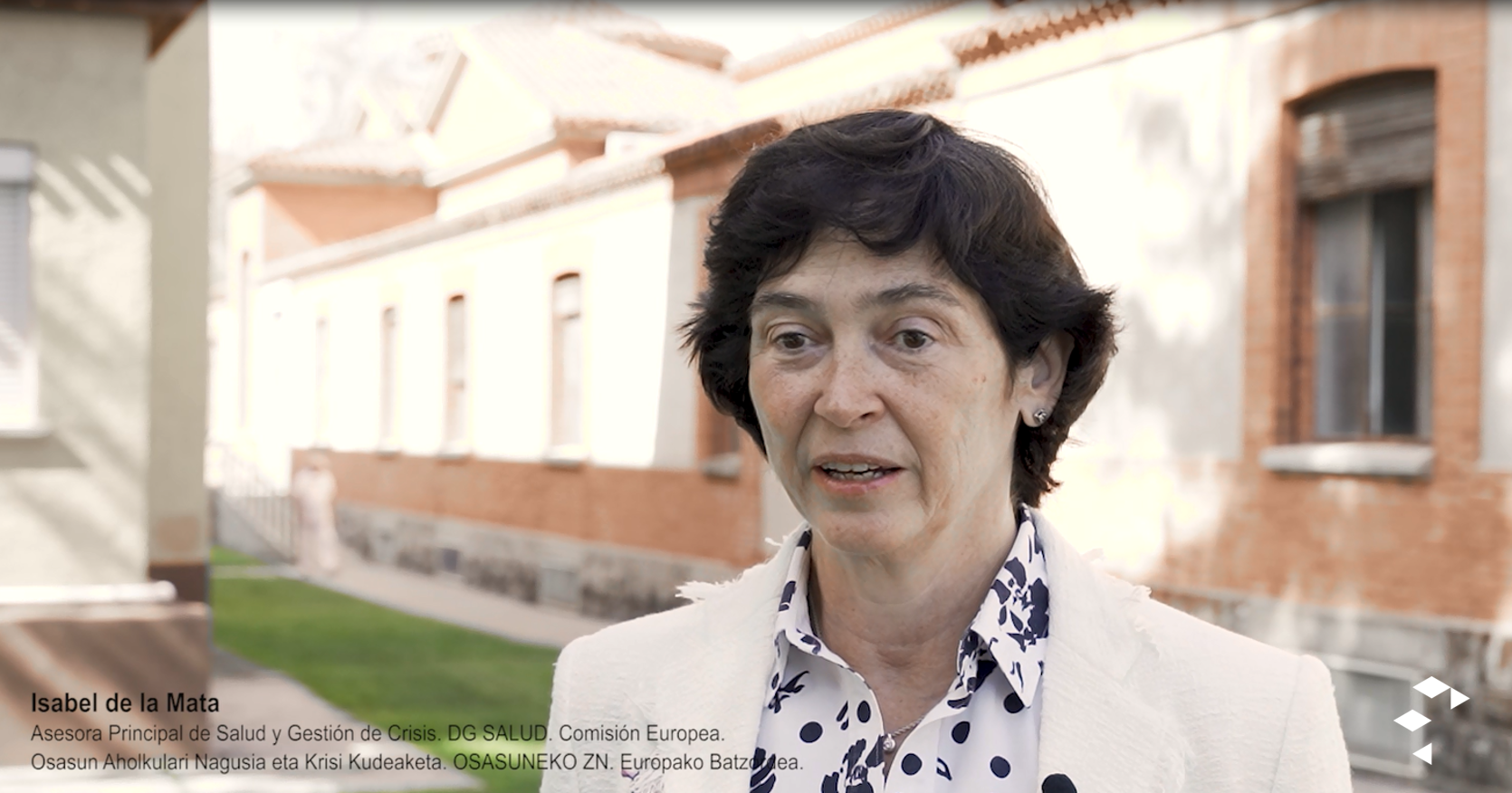
Navarra highlights its involvement and coordination with the European public health strategy
The departments of Citizen Relations and Health bring together health research professionals from the Regional Community at the HUN in the Meeting "Public health: research and progress with Europe", organized by Navarrabiomed.
Through the departments of Citizen Relations and Health, health research professionals from the Foral Community at the University Hospital of Navarra (HUN) gathered this morning at the meeting "Public Health: research and progress with Europe", to promote the health strategy of the European Union, its implementation in the Foral Community and its impact on the well-being of the population.
The conference was organized by the Navarrabiomed biomedical research centre and funded by Citizen Relations, through the call for aid for the dissemination of EU policies and strategies.
Research priorities and challenges go from research in patient care, to prevention and health promotion. All aspects of healthcare have been analysed from the perspective whereby the European strategy will translate into tangible and beneficial results for citizens and the region.
During the institutional opening, the Ministers of Citizen Relations, Ana Ollo, and of Health, Santos Induráin, accompanied Isabel de la Mata, senior advisor for Health and Crisis Management of the Directorate General of Health of the European Commission.
“Public health is a priority”
Minister Ollo recalled that “health is an investment and, with a budget of 5,300 million euros for the period 2021-2027, the UE pro Salud program involves unprecedented financial support from the European Union in the healthcare area. The clear message of this program is that public health is a priority and it is one of the main instruments to pave the way towards a European Health Union.” “It is undoubtedly a great opportunity that we should take advantage of, but not the only one.”
“We must not forget the 2021-2027 Multiannual Financial Framework and, in this regard, from the European Projects Office, we monitor all the opportunities it offers and research programs such as Horizon Europe or POCTEFA for cross-border cooperation, are examples. But Europe is much more than money and financing. Europe is the defence of human rights, diversity and plurality. Europe is the democratic consultation of the Conference on the Future of Europe and Europe is the joint response to the energy crisis situation. In short, with its hits and misses, Europe is the best territory in the world to live”, continued Ollo.
“Quality healthcare system, with coverage without distinction”
In this context, the Minister of Health has added that “Europe's most differentiating feature with respect to the rest of the continents in the world is its quality and supportive health system offering extensive coverage to any citizen without distinction.”
She also encouraged participation in European projects. She explained that the COVID-19 pandemic has fostered an enormous sensitivity in the European institutions about the need to complement national health policies. “We cannot miss this chance and must continue working to increase our community's participation in European projects aimed at improving disease prevention, equal access to modern efficient healthcare for all Europeans, and coordination in the face of serious health threats affecting more than one EU country”, noted Minister Induráin.
Towards a European Health Union
In this regard, the attendees were able to learn about the European health strategy from Isabel de la Mata, senior advisor for Health and Crisis Management of the Directorate General of Health of the European Commission. De la Mata has highlighted “the need and the steps to follow to build the European Health Union".
“EU health policy focuses on the protection and improvement of health, equal access to modern efficient healthcare for all Europeans, and coordination in the face of serious health threats affecting more than one EU country. Europe must build a stronger European Health Union. To do this, it relies on a EU4Health program, endowed with future guarantees and adequate financing, a strengthened European Medicines Agency (EMA) and a strengthened European Centre for Disease Prevention and Control (ECDC).”
From the perspective of the regional development of the strategy, Carlos Artundo, Director General of Health of the Government of Navarra has insisted that “we have to keep working harder and better with Europe. We must continue betting on research because it is the only way to progress and improve people's health”.
From Europe to the region: four round tables with experts from the Regional Community
Experts from the different health areas have presented the work carried out in Navarra and the existing challenges, both in Europe and in Navarra, in different areas: Disease prevention and health promotion, cooperation, improvement of medicines and therapies; use of health data, are all priorities
During the “Health promotion and research" roundtable, participants pointed out that new areas are emerging such as mental health, environmental pollution or social determinants that have a direct impact on health inequality. Therefore, these should be taken into account both in research and in health promotion actions.
As for cooperation, experts have stressed that the challenge of involving all stakeholders who may have a key role in health care from all points of view is enormous. We are talking about cooperation at the regional, European and international levels. It is about positioning our territory as a reference for the implementation of new health strategies and cooperating internationally to go forward.
At the roundtable "Anticipating changes in the pharmaceutical field”, the focus was placed on the context of strategic, legislative and technological (genomics) changes characterizing the sector. Pharmaceutical policy is very necessary due to the social value of biomedical innovation both from the point of view of its important impact on people's health and quality of life results and its impact on the economic development of the territory.
The last roundtable focused on the secondary use of health data: “Sketching the future of health research in Navarra with Europe”. Data science, artificial intelligence and other technologies are changing healthcare and participating in the economic development of our community and the well-being of our society.
The trend in the health field is to incorporate more and more data that come from very diverse sources, making available information that can be of great relevance for researchers, health professionals and, above all, for patients.
One of the main impacts of incorporating data in the health field is the development of precision personalized medicine. So it is essential to be able to share data - genomic data in particular - “homogeneously” and anonymously for the benefit of patients.
The role of research
Iñigo Lasa, Director of Navarrabiomed, was in charge of drawing the conclusions of the meeting. “Throughout today's conference, it has become clear how important it is that research permeates all areas of the health system against that widespread idea in society that research is something that happens only in laboratories. Research, as we have seen, is also developing information systems that allow access, analysis and interaction with patient data in a dynamic and secure way, research is also to prepare the infrastructures to host new health methodologies or new pharmaceutical treatments. Research is to have a strong and agile epidemiological surveillance system that participates in the development and use of epidemiological analysis methodologies to analyse health situations.”
According to Lasa, a health system that is aware and active in research is a health system that is more critical of the procedures it uses, it is a more versatile health system to accommodate new methodologies, it is a more rigorous health system in the use of resources, it is a more competent health system, and it is a health system in which its staff, its great asset, is happier.
Photo from left. to right. Iñigo Lasa, director of Navarrabiomed; Carlos Artundo, director general of Health; Santos Induráin, Health Minister; Isabel de la Mata, senior advisor for Health and Crisis Management of the Directorate General of Health of the European Commission; Ana Ollo, Minister for Citizen Relations; Sergio Pérez, director general of External Action; and Marisol Fragoso, management director of Navarrabiomed.


